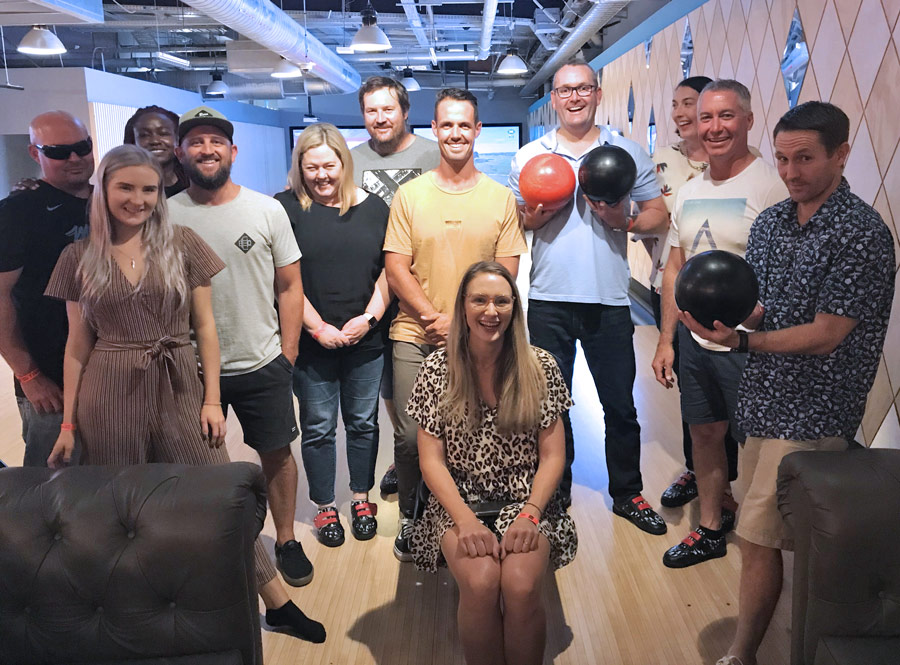1. Communication
People at all levels of a team like to know what’s going on. They also like to know there is a goal and a plan to get there, and where they might fit into that plan. Fortunately, the goal at BADGE is very clear – our vision is to be Contractor of Choice.
We communicate this goal often from an executive level, but we must back that up by ensuring all of our people understand what it means and what they can do in their role to act on it. We also need to be honest about how we are progressing against the plan. If everyone buys into what we are trying to achieve as a group, and we consistently promote our plan through good communication, we quickly see people pulling in the same direction and helping others along.
Following on from this, we have seen great benefit in simply keeping the team informed about day-to-day activities. We run a 10-minute team catch-up on a Monday morning to let everyone know what is going on around the place and what different people are up to. This keeps everyone involved.
I also encourage people to recognise the importance of informal communication around the office and on site – because that type of information-sharing can often be the most valuable of all.
2. Promoting team spirit
Having pride in our brand and delivering projects we can all be proud of can build its own momentum. When we’re united with one team spirit, people naturally look out for each other. Then there’s a great collective will to jump in and give someone else a hand wherever it’s needed.
Everyone can play a part in every part of the business. That could be procurement personnel supporting a construction team and vice versa, or operational staff getting involved in business development activities. Over the last few years there have been plenty of tendering opportunities that non-procurement staff have actively brought to the attention of the procurement team, which have turned into projects that we’ve delivered. Promoting that involvement goes a long way to getting people invested in the cause and reminding everyone that we’re all on the same team.
That’s also a side-benefit of the work we do that assists the community. Whether our participation is big or small, people from all corners of the business come together to volunteer, and we represent the values of the brand as one team.
Social interaction matters too. Ringing the bell when we win a project, Friday arvo drinks, and going out for the occasional team lunch always goes down well. The current COVID-19 situation means we can’t take our normal approach to this for a while, but we will adapt – because we’re still a team and it’s important that we stay connected on a social level as much as we can.
3. A healthy environment
Heathy competition and a bit of friendly banter between teams is a good thing. That’s in the air every day around our office. We want to have fun with our work where we can, and a big part of that is not taking things too seriously – apart from safety and quality of course!
We also show staff that they have an individual pathway for development and progression, and support that with training and coaching, so that they can have real ambition when they come to work here. By the same token, rewarding good individual and team performances is an important part of the way we celebrate successes.
Then there’s literally staying healthy. Our people know we’ll be flexible where we can around what’s happening with them outside work so that they can confidently pursue a good work-life balance. And our people understand the importance of empathy – we do our best to identify when someone is struggling and we do something about it, whether that’s through conversations with colleagues or our Employee Assistance Program.
Our recently-completed major office renovation will help in this department too!
4. Making the time
This is probably one of the biggest challenges we face. Between regular structured catch-ups and simply making it known that the door is always open, it’s crucial that everyone at every level finds time for their colleagues.
Talking to someone for five minutes could make all the difference to them – and it could give you a new perspective as well. That’s come true for me so many times over the years and it’s gone a long way to building the personal relationships I’ve enjoyed with everyone here.
Following up is also important. Meeting someone to talk about an issue is one thing, but making the time to do something about it is another. Even if you don’t have the answer straight away, the other people invested in the issue should know you’re onto it.
I meet each of the Construction Managers in my team for a half hour every week, either on a Monday or Tuesday. We look at the week ahead and stay in touch on any issues from there. By committing to that half hour, we’re set up to hold each other accountable for following up on issues that week – we’re each going to do our bit before the next meeting rolls around.
And we shouldn’t forget that everyone’s time is important to them. Starting and finishing meetings as scheduled is as important as being on time in general.
5. Compatibility
This last one is ideally something which strengthens naturally when the first four are working well. I think we’ve been able to keep a stable team together because it’s made up of very compatible people. They’ve shown through the recruitment process that they understand who we are, and we make sure they’re welcomed from the start.
We work well together, we get along well together, we’re like-minded people generally pushing in the same direction – and we’ve grown further into that over time.
Browse more BADGE Blog posts


